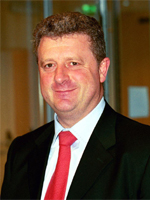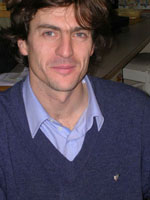Logics for Data and Knowledge Representation
a.a. 2008 - 2009
Lecturers:
Fausto Giunchiglia
fausto [ at ] disi.unitn.it |
Alessandro Agostini
agostini [ at ] disi.unitn.it |
Fausto Giunchiglia
fausto [ at ] disi.unitn.it |
Alessandro Agostini
agostini [ at ] disi.unitn.it |
(*) Please always check latest news below!
- Tuesday 14:30 - 16:30, Faculty of Science, room 208
- Thursday 16:30 - 18:30, Faculty of Science, room 208
Reception Time and Location:
- Office hours at DISI-UniTn: by appointment.
News and Announcements:
- Tue 21.07.2009: Results of the Exam, Session II (Mon 20 July):
1. GASPARELLA Luca (135834), 15
2. IORI Enrico (130007), 13.5
3. MATTAREI Cristian (132177), 9.5 (*)
4. MOVER Sergio (133889), 15
5. PHAN Quoc Sang (135264), 15
6. SARTORI Enrico (138531), --(*) Admitted to the oral exam under condition. The oral exam is tomorrow, Wednesday 22 July, at 14:30 in room 208.
- Tue 09.06.2009: Results of the Exam, Session I (Mon 8 June):
List of results no more available.
- Tue 09.06.2009: The oral exam is tomorrow, Wednesday 10 June, at 14:30 in room 207. The results will be posted on this website later tonight.
- Mon 25.05.2009: Slides Week 14 posted, syllabus updated, reference CXL2 posted.
- Fri 15.05.2009: No lecture on Tuesday 19 May. See you on Thursday 21!
- Fri 15.05.2009: Slides Week 13 posted, syllabus updated (references NML1-2, CXL1, WCXL1 posted).
- Fri 08.05.2009: Slides Weeks 11,12 posted, syllabus updated (references DL3, DL4 posted).
- 03.05.2009: No lecture on Tuesday 5 May. See you on Thursday 7.
- 03.05.2009: Results of the Midterm Exam (Thu 16 April):
List of results no more available.
- Fri 24.04.2009: Slides Week 10 posted, syllabus updated (references DL1, DL2, and WDL1 posted). Results of Midterm exam (Week 9, Thu 16 April) will be posted soon.
- Fri 24.04.2009: Solutions of exercises of the midterm exam (Week 9, Thu 16 April) are available here (PDF).
- Fri 24.04.2009: Errata: C is subsumed by D iff for all x C(x) implies D(x). Peano used the symbol of inclusion (which is used to define the semantics of subsumption) exactly with the *opposite meaning* of the meaning universally given at present to that symbol. Sorry for the inconvenience. - AA
- Fri 10.04.2009: Slides Week 8 posted, syllabus updated.
- Fri 03.04.2009: Slides Week 7 posted, syllabus updated.
- Fri 27.03.2009: Slides Weeks 5,6 posted, syllabus updated.
- Thu 19.03.2009: No lecture today. See you on Tuesday 24.
- Fri 13.03.2009: Slides Weeks 3,4 posted, syllabus updated.
- Mon 02.03.2009: Slides Week 2 posted, syllabus updated.
- Mon 23.02.2009: Slides Week 1 posted, syllabus updated.
- Tue 17.02.2009: This site online. Welcome!
COURSE OBJECTIVES AND OUTCOMES:The goal of this course is to provide motivations, definitions and techinques in support of the usefulness of logic in the effective and efficient modeling of data and knowledge.
The course will have succeeded if it stimulates the interested students to continue their career with higher interest into logic-based models for data and knowledge representation in their own field of expertise, and to produce computer-processable solutions of relevant problems.
GENERAL DESCRIPTION:The use of logic in computer science is very well-documented. The exponential increase of literature on every area of computer science has forced both definition and use of logical formalisms for knowledge representation and reasoning into greater complexity, and this complexity has in turn necessitated a deeper study of the principles by which logical models may be constucted. It has become more and more apparent, say since the 1989' First International Conference on the Principles of Knowledge Representation and Reasoning (KR-89), that knowledge representation models and reasoning models are only different views of the same common problem.
Different logic-based approaches to data and knowledge representation and reasoning are beginning to converge. It seems therefore useful to try to accelerate this process by trying to provide a survey, as uniform as possible presentation of the whole problem of logic-based modeling of data and knowlege, treating the subject on general theoretical lines, yet filled in with practical examples from real-world scenarios, problems and applications, with a particular attention paid to the borderlines and inter-relationships among all logics presented.
There is as yet no unified theory of logic-based models for data and knowledge representation, and a good deal of practical systems and working devices are not logic-based in their design foundation and unsullied by any logical model. There is nevertheless a real need for the subject to be looked at as a whole.
PREREQUISITES:Mathematical logic knowledge at the undergraduate graduate level is strongly recommended. The prerequisite topics are covered, for example, by the course "Mathematical logic" of the first year of the Master Program in Computer Science.
The course provides the necessary definitions, properties and examples, as well as pointers to the suggested background readings. The ability to follow and appreciate abstract arguments is encouraged.
COURSE'S CONTENTS:
- Data, Knowledge, Representation, Logics.
- From world to models.
- The Logic of Propositions
- The Logic of Classes.
- Application: Lightweight ontologies and matching.
- The Logic of Predicates.
- Application: Querying of databases.
- The Logic of Descriptions.
- Application: Ontology modeling.
- Application: OWL.
- Application: Security.
- Application: Query-answering
- The Logic of Defaults.
- Application: Inheritance Hierachies.
- The Logic of Contexts.
- Application: C-OWL.
- Conclusions and thesis proposals.
LECTURES - TEACHING METHODOLOGY:Formal lectures with lots of examples and exercises will be held twice a week on Tuesdays and Thursdays for 1.5 hours according to the scheduling above. You are responsible for material presented in lectures, including oral comments made by the lecturers.
The course encourages and increases the opportunities for students to be involved in research under the guidance of the lecturers. As soon as our LDKR Web 2.0 platform has been activated (see below), the course actively engages students in learning opportunities provided by adding extra-contents like examples, questions and exercises on the course's topics.
HANDOUTS:All material presented in class will be available through handouts. Most handouts (i.e., lectures notes or 6 pages per sheet slides' layout) will be made available on the server in formats suitable for printing. Students should download and print out the handouts from this site---please see the links in the course Syllabus. We will post the material a few days after each lecture, if not stated otherwise.
BASIC READINGS:Textbook:
- There is no basic or mandatory written reference for this course.
SUGGESTED READINGS:A list of suggested readings (e.g. chapters in advanced/reference textbooks and collections, and research papers) will be available as the course proceeds.
- [BX] Any textbook on mathematical logic. (In our Library there are many, just do your choice. We will be happy to know what is your favourite!) Some suggestions follow.
- [B1] S.C. Kleene, "Introduction to Metamathematics", North-Holland, 1952.
- [B2] E. Mendelson: "Introduction to Mathematical Logic - Third edition", Wadsworth Inc., Belmont, CA, 1987.
- [B3] G. Boolos, J. Burgess, R. Jeffrey, Computability and Logic, 4th edition. Cambridge University Press, 2002.
- [B4] M. Huth and M. Ryan, "Logic in Computer Science", Cambridge University Press, 2004(2006).
- [DL1] F. Baader, D. Calvanese, D.L. McGuinness, D. Nardi and P.F. Patel-Schneider, "Handbook of Description Logics", Cambridge University Press, Cambridge, UK, 2002.
http://www.cambridge.org/catalogue/catalogue.asp? isbn=0521781760. See expecially 1,2,4,10, all available online. For example here:
Ch 1: "An Introduction to Description Logics"
Ch 2: "Basic Description Logics"
Ch 4: "Relationships with other formalisms"
Ch 10: "Conceptual Modelling with Description Logics".- [DL2] B. Nebel, Terminological Cycles: Semantics and Computational Properties. In Principles of Semantic Networks, J. F. Sowa (ed.), pp 331--362, Morgan Kaufmann, San Mateo, CA, 1991.
- [DL3] I. Horrocks and P.F. Patel-Schneider, Reducing OWL Entailment to Description Logic Satisfiability. In Proceedings of the Second International Semantic Web Conference (ISWC-03), pp 17--29, Springer-Verlag LNCS 2870, Berlin Heidelberg, 2003.
- [DL4] G. Antoniou and F. van Harmelen, "A Semantic Primer", The MIT Press, 2004. (Chs 1, 4)
http://www.ics.forth.gr/isl/swprimer/.- [NML1] G. Brewka, "Nonmonotonic reasoning: Logical Foundations of Commonsense", Cambridge University Press, Cambridge, UK, 1991.
- [NML2] R. Reiter, "A Logic for Default Reasoning", Artificial Intelligence, 1980,13(1-2), pp 81--132.
- [CXL1] C. Ghidini, F. Giunchiglia, "Local Model Semantics, or contextual reasoning = locality + compatibility." Artificial Intelligence, 127(2):221-259, 2001. PDF here
- [CXL2] P. Bouquet, F. Giunchiglia, F. van Harmelen, L. Serafini, H. Stuckenschmidt, "C-OWL: Contextualizing Ontologies." Proceedings of the Second Internatinal Semantic Web Conference (ISWC-03), Springer-Verlag LNCS 2870, Berlin Heidelberg, 2003, pp. 164-179. PDF here (preprint version)
OTHER RESOURCES:A list of web resources will be available as the course proceeds.
- [WDL1] Description Logics Courses and Tutorials.
- [WCXL1] Context Logics @ UniTn. This website is not updated but still very useful.
EXAMINATION and GRADING:The exam consists of various written exercises and tests. An exercise can be: a "yes/no" question, proving some simple properties, formalizing an informal specification, and so on. There is also an optional oral examination, which starts from a discussion of the written exam.
EXAMS (Scheduling):The following Exam Sessions are planned. Please check the latest news for updatings.
Session I - June 2009:
- [written] Mon 08, at 10:00, room 208.
- [oral (*)] Wed 10 since 14:30, room 207.
(*) For those students who have passed the written exam.Session II - July 2009:
- [written] Mon 20, at 10:00, room 208.
- [oral (*)] Wed 22 since 14:30, room 208.
(*) For those students who have passed the written exam.Session III - September 2009:
- [written] Mon 07, at 10:00 room 208.
- [oral (*)] TBA.
(*) If any (optional).Session IV - January 2010:
- [written] Mon 18.
- [oral (*)] TBA.
(*) If any (optional).Session V - February 2010:
- [written] Mon 8.
- [oral (*)] TBA.
(*) If any (optional).
[ Further information and bug reports | Return top to this Page | Last modified: 21/07/2009]
|
|